Sleepy in the afternoon? Sluggish in the morning? Unable to fall asleep at night? Finding meditation or study difficult? You may be planning your activities at times when they work against you rather than for you.
While writing my last article on sleep, I got really excited by the new research lending scientific weight to the wisdom of daily rhythms in Ayurveda. Following the flow of these daily rhythms makes a huge difference to our health, happiness and productivity.
All parts of the day are not equal
The time of day affects our bodies, this is known and proven. Activities within our bodies such as sleeping-waking, body temperature, appetite, thirst, cell regeneration and brain-wave activity have all been shown to be governed by time. The cues the body uses to keep these circadian clocks on time include sun-set and sun-rise.
The processes in our bodies which make us healthy and fit are therefore enhanced at certain times of the day. Our choice of timings for activities such as eating, exercising, studying and sleeping are crucial.
What to do when – 6 important stages
We can divide up the day by looking at how the particular energetic and physical qualities of a time of day affect the doshas(the interplay of elements in the body). 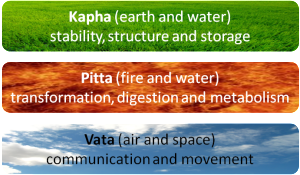
This shows 6 periods of the day. At our equinoxes (and for those countries near the equator), these periods are each 4 hours long.
From sunrise – kapha time
 The first period after sunrise is a time of growth and nourishment. The body is at its strongest and yet has the tendency to be a bit more sluggish or sleepy. Our kapha is increased at this time, so this is known as the kapha period.
The first period after sunrise is a time of growth and nourishment. The body is at its strongest and yet has the tendency to be a bit more sluggish or sleepy. Our kapha is increased at this time, so this is known as the kapha period.
DO exercise, yoga and physically demanding work.
DON’T sleep into this time as the increased kapha will mean you’ll be more sluggish, dull and feel less energy despite having more sleep.
Mid-day – pitta time
 Next is the time in which our pitta is increased – the pitta period. This is the time of highest transformation and metabolism. Our digestive fire is at its highest as is our fire to get things done.
Next is the time in which our pitta is increased – the pitta period. This is the time of highest transformation and metabolism. Our digestive fire is at its highest as is our fire to get things done.
DO eat your biggest meal.
DON’T skimp on this meal or delay it too late in the afternoon. If you don’t eat a quality meal at this time, you’ll experience an energy drop later in the afternoon (vata time) when the brain demands energy. You may experience this as tiredness or a craving for sugar or caffeine.
Late afternoon – vata time
 Finally, as the sun starts to move towards the horizon, the vata period begins. This is the time of movement and change, as the vata within us increases. Our fastest reaction times have been shown to occur at about 3.30pm, in the middle of this vata period. If we have eaten well earlier and have energy, our brain will have space for creativity and ideas. Towards the end of the vata period, towards sunset, there is a rarefied atmosphere conducive to quieter reflective activities.
Finally, as the sun starts to move towards the horizon, the vata period begins. This is the time of movement and change, as the vata within us increases. Our fastest reaction times have been shown to occur at about 3.30pm, in the middle of this vata period. If we have eaten well earlier and have energy, our brain will have space for creativity and ideas. Towards the end of the vata period, towards sunset, there is a rarefied atmosphere conducive to quieter reflective activities.
DO use this period to be creative or study. Use the end of the vata period towards sunset to meditate, pray or do reflective study.
DON’T rush around doing energetic, physical activities or eat a heavy meal.
Evening – kapha time
 After sunset, the more sluggish kapha period sets in again. The body begins to secrete melatonin and naturally starts its wind down towards sleep.
After sunset, the more sluggish kapha period sets in again. The body begins to secrete melatonin and naturally starts its wind down towards sleep.
DO have a light meal at the beginning of the kapha time so it has time to be digested before bed. It should be lighter at this time of day as digestion is weaker. Then let the heavy, kapha dosha lull you gently towards sleep. Take advantage of it, it is what your body is programmed to do.
DON’T resist the lull of sleep and try and stay up for more ‘me-time’ as you’ll likely enter the pitta period, get a second wind and sleep will be much more elusive and of poorer quality.
Mid-night – pitta time
 For the core part of the night, it is pitta time where again transformation and metabolism are at their peak. The liver will be actively working on toxins accumulated during the day and the mind will be digesting the experiences and emotions of the day.
For the core part of the night, it is pitta time where again transformation and metabolism are at their peak. The liver will be actively working on toxins accumulated during the day and the mind will be digesting the experiences and emotions of the day.
DO make sure you are asleep during this time so it is used for what is needed. Leave the liver and mind alone to do their job.
DON’T add more food, stimulants or alcohol to the body’s workload at this time. You will get away with it now and then but if you repeat this pattern for long periods of time, you’ll find yourself with liver problems.
Before sunrise – vata time
 If you have followed the body’s natural urges and gone to sleep in the kapha period the night before, you should find you wake naturally before or around sunrise, in the vata period. The clear qualities of this special time before and during sunrise give us mental space and peace and as with sunset, are particularly useful for reflective activities.
If you have followed the body’s natural urges and gone to sleep in the kapha period the night before, you should find you wake naturally before or around sunrise, in the vata period. The clear qualities of this special time before and during sunrise give us mental space and peace and as with sunset, are particularly useful for reflective activities.
DO wake during the vata period (before sunrise), give yourself time to evacuate your bowels and then meditate, pray or engage in reflective study.
DON’T allow your sleep to continue into the kapha period or you will find your energy is sapped.
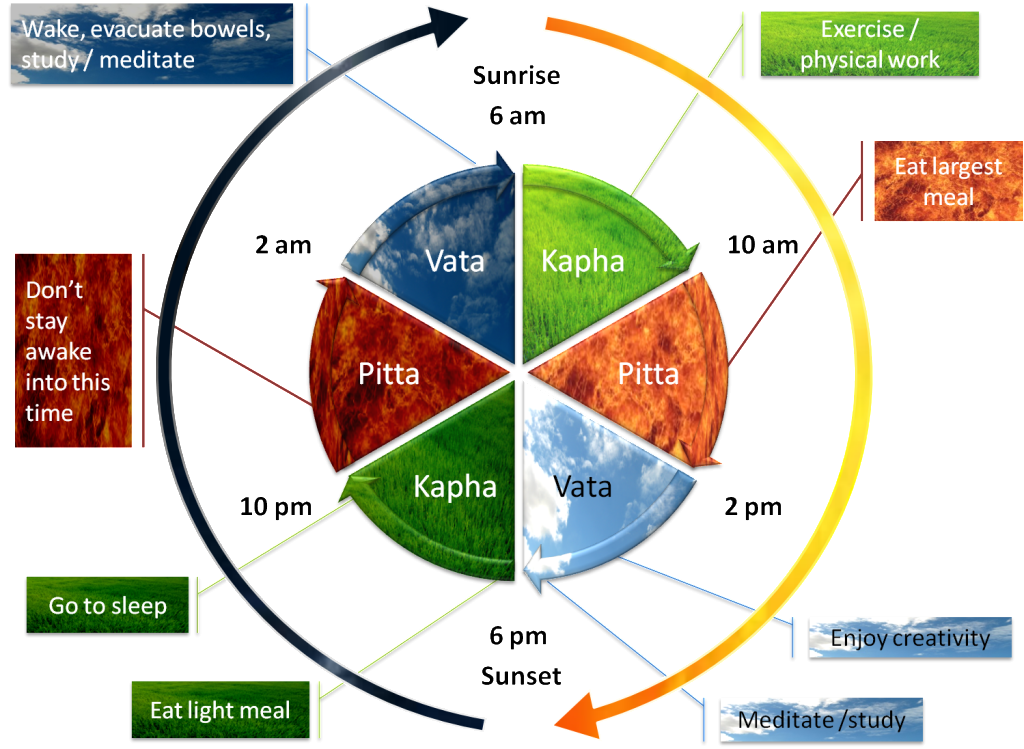
Timings throughout the year
At our spring and autumn equinoxes, we roughly have equal day and night and thus the doshic cycles are easy to see; 4 hourly cycles beginning at sunrise.
Throughout the rest of the year, for a northern country such as the UK, the timings of sunset vary from 4.50am in mid summer (with over 17 hours of daylight) to 8.00am in mid winter (with just 8 hours of daylight). Therefore, the cycles of these energies condenses and extends depending on the season.
Here is an idea of the cycles in the UK*. If you’d like to work them out for where you live, you just need to find out the times of sunrise and sunset, and divide the times between them into three.
*The clocks change at the end of March and October so you see strange jumps in April and November.
Enjoy the daily rhythms and enjoy the ease of life that comes from following them.
Until next time, take care of yourselves.
Kate
Author: Kate Siraj, Ayurvedic Practitioner, BSc Ayurveda, MChem (Oxon), MAPA. © The Ayurveda Practice
Sun and Moon photo thanks to Freedigitalphotos.net

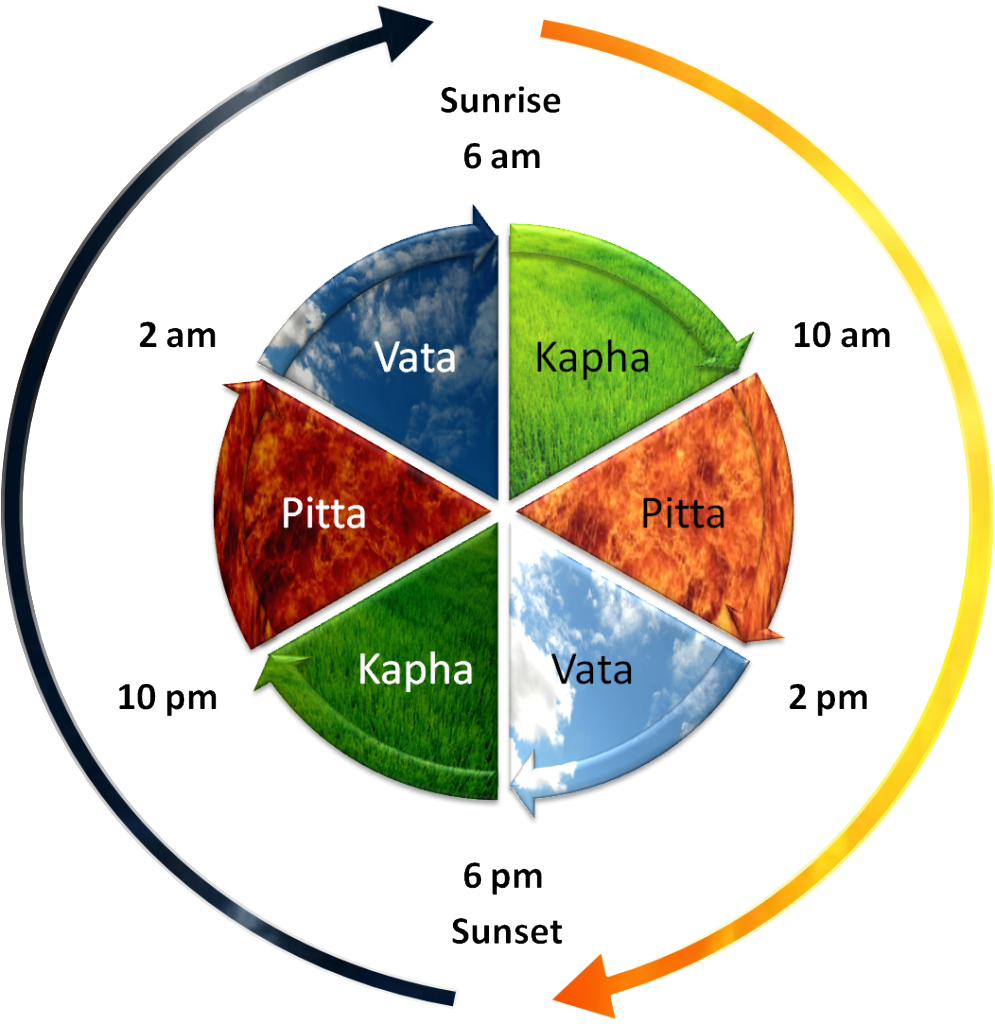
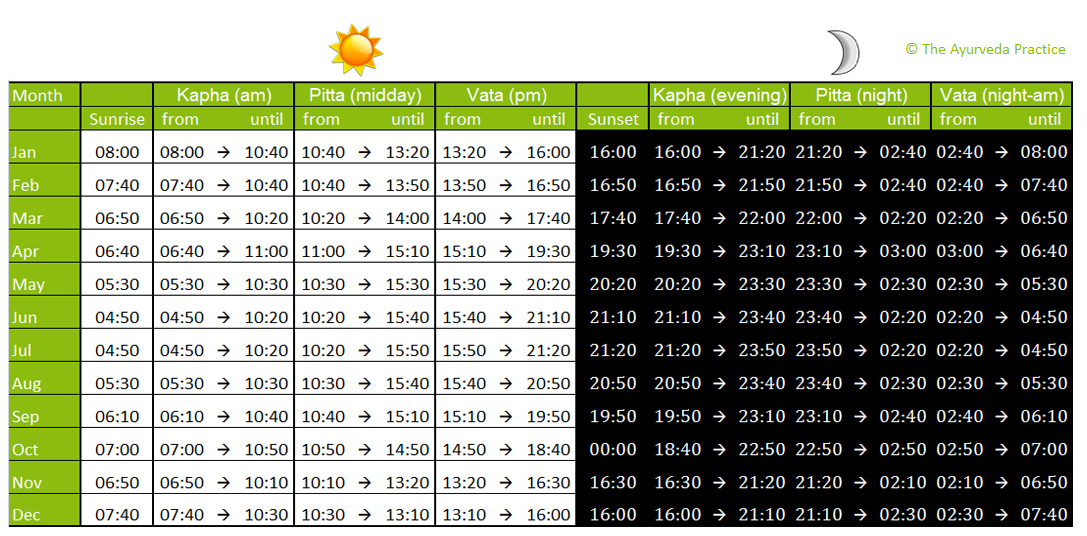


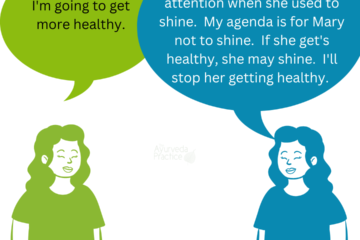
3 Comments
Claire · December 1, 2015 at 10:57
Brilliant article Kate – really appreciate the seasonal calendar 🙂
Smoothies and juices – choose wisely - The Ayurveda Practice · March 15, 2016 at 14:26
[…] at mid-day when digestion is strongest. The time of day when our digestive fire is at its peak and best able to digest more challenging foods is around […]
Women, love your cycle (and men, it REALLY helps to know) - The Ayurveda Practice · March 16, 2018 at 13:04
[…] of us, male and female, have rest-activity-rest cycles; most notably our daily circadian rhythms and less obviously yearly seasonal rhythms. These allow us to do activity supremely well when we […]